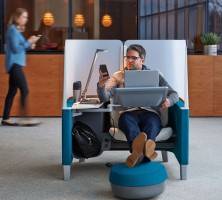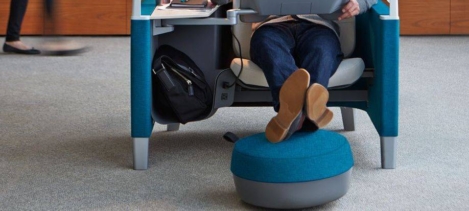June 17, 2015
Neocon workplace design show announces this year’s award winning products
 Today is the final day of the vast Neocon workplace design
Today is the final day of the vast Neocon workplace design
convention in Chicago. It is one of the world’s last remaining bastions of the supposedly dying art of the exhibition, in which tens of thousands of like-minded people from around the world descend on a city to live on alcohol, nibbles and hot fluorescent light in between discussing the products and ideas that hold their careers together. From the outside of any sector, this all looks like a collective madness, but from the inside things look very different. For some reason, the first day is the day on which those products which are judged to be Neocon’s best are presented their accolades. So even before our review of the show (coming soon), here are its award winning products including gongs for familiar names such as Boss, Humanscale, BuzziSpace, KI and Steelcase.


















 A new study published yesterday in the British Journal of Sports Medicine claims that office workers spend far too much time sitting, are suffering from a range of conditions and illnesses as a result and so should be encouraged to spend up to half of each working while standing. The report,
A new study published yesterday in the British Journal of Sports Medicine claims that office workers spend far too much time sitting, are suffering from a range of conditions and illnesses as a result and so should be encouraged to spend up to half of each working while standing. The report, 















June 8, 2015
Three reasons why National Work From Home Day has it all wrong
by Mark Eltringham • Comment, Flexible working, Public Sector, Technology
Last Friday was National Work From Home Day in the UK. Each year, the TUC and organisers Work Wise seem to take this as an opportunity to analyse data about the uptake of flexible working and arrive at the wrong conclusions. This year, its analysis of the ONS Labour Force Survey found that the number of people regularly working from home had increased by more than 800,000 since 2005, taking the total to over 4.2 million. These are solid enough data, but what are we to make of TUC General Secretary Frances O’Grady’s conclusion that: “these figures show millions of British workers have adopted homeworking and are enjoying a better work-life balance, while saving time and money on costly commuting that benefits no-one”? There are several reasons to suggest that he’s got that wrong to a large extent.
(more…)